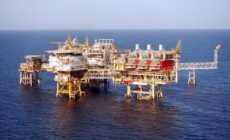Oil production to hit 190,000 barrels per day
- Posted on
- Comment
 Production of oil in Ghana will hit 190,000 barrels per day by the end of the year, Ecobank Research has projected.
Production of oil in Ghana will hit 190,000 barrels per day by the end of the year, Ecobank Research has projected.
This is against 110,000 barrels of oil currently being produced by the Jubilee (80,000 b/d) and the Tweneboa, Enyenra and Ntomme (TEN, 30,000b/d) fields.
If achieved, this would make Ghana the 6th leading producer of oil in middle Africa.
The realization of the increased production will be dependent on the replacement of the turret bearing on the FPSO Kwame Nkrumah which will restore production volume to the average 110, 000 per day on the Jubilee field.
Additionally, full production (80,000 b/d) at the TEN field can only be achieved if the border dispute between Ghana and Ivory Coast over the TEN catchment area is resolved in favour of Ghana.
A total of both Jubilee and TEN would ramp up to the projected 190,000 barrels per day.
With just two weeks to end the year, it may be unrealistic to expect an increase in production volumes.
The increase in oil production will trigger a boost in revenue for the new coming administration led by President-elect Nana Addo Dankwa Akufo-Addo.
Nigeria is the number one producer of oil in Africa with 2.35 million barrels of oil per day followed by Angola (2ndin Africa) and Equatorial Guinea (about 5th in Africa) with 2.14 million and 342,000 barrels per day respectively. Congo Brazzaville and Gabon are 4th and 5th respectively in middle Africa with production of 382,000 and 223,000 barrels of oil per day.
The report also stated that PetroGulf Ghana Limited has entered into a share purchase and sale agreement to acquire Eco Atlantic (Ghana) Limited, a company that owns 50.51 percent interest in Three Point West Deep Water Offshore block (Ghana block), from Eco (Atlantic) Oil & Gas Limited for a purchase consideration of US$0.58 million. The transaction is expected to enable PetroGulf to increase its interest in the Ghana block.
In August 2016, Tullow oil and its partners in the Tweneboa, Enyenra and Ntomme (TEN) project offshore Ghana commenced oil production from the project. The field became Ghana’s second large scale producing field after Jubilee field also operated by Tullow Oil.
Production commenced on time and the partners targeted ramping up output to the Floating Production Storage and Offloading FPSO capacity of 80,000b/d by the end of 2016. The partners expect annualized production level to average 23,000b/d.
Ghana’s production averaged 110,000b/d in 2015. Production from TEN was expected to augment volume lost during Jubilee’s downtime.
Meanwhile, Tullow oil is set to restart exploration and appraisal activities in Kenya following more positive seismic data.
The company which is the major oil company in Kenya’s South Lokichar field has estimated that the onshore asset could be holding up to 1 billion barrels of hydrocarbon. Recent financial performance has resulted in the company cutting back on exploration activities, especially in Kenya where disagreement over export pipeline is complicating project evaluation.
However, Tullow could unlock more value from its 50 percent stake across different licenses in the east Africa country by conducting further exploration work.
In a related development, oil sold for more than $US51 on the international market. Oil producers look to be turning word into deed with Saudi Arabia and Kuwait on the verge of following through on an agreement to cut production for the first time in eight years.








 (Selorm) |
(Selorm) |  (Nana Kwesi)
(Nana Kwesi)